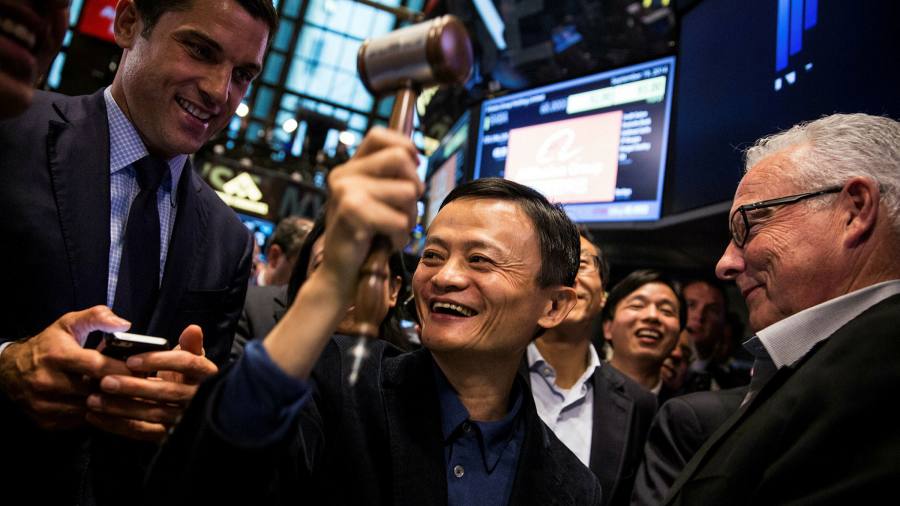
China is preparing a blacklist that is expected to tightly restrict the main channel used by start-ups to attract international capital and list overseas, in a bid to limit the role of foreign shareholders in the country’s next generation of tech companies.
The blacklist will target new companies in sensitive sectors that use so-called variable interest entities to run their China businesses, according to four people familiar with the matter. They did not expect the changes to apply to existing companies.
VIEs are a legal structure that has been used for decades by Chinese tech groups — including industry leaders Alibaba and Tencent — to circumvent foreign investment restrictions and raise billions of dollars from international investors.
The list, which is being formulated by Chinese authorities including the state planner, commerce ministry, securities regulator and central bank, follows a tech sector crackdown over the past year that culminated in an announcement last week by ride-hailing group Didi Chuxing that it would delist from the New York Stock Exchange.
It was not yet clear how wide-reaching the list will be, but people familiar with the matter said the new negative list for VIEs could include sectors that were data-intensive or involved national security concerns. The US has taken similar measures to restrict Chinese investment in Silicon Valley start-ups.
Chinese authorities have accused the country’s large consumer internet groups of focusing on eliminating competition instead of helping the country to catch up with the US in semiconductors and other advanced technologies.
Regulators have taken antitrust and data security measures against the main companies, starting with billionaire Jack Ma’s Ant Group, which was forced to cancel what would have been the world’s largest initial public offering last year.

Two people close to financial regulators said the negative list was not intended to affect existing companies that were using the VIE structure. Instead, it was aimed at ensuring that future national champions critical to the country’s economy would not be dominated by foreign shareholders.
“VIEs are not dead entirely, but essentially they are [for future purposes],” said one of the people.
“In the future, foreign investors can put money into traditional industries as opposed to tech,” the person said, adding that such industries did not need to use the VIE structure to bring in foreign capital.
Chinese tech groups turned to VIEs two decades ago but authorities have not officially addressed the complicated legal structures, preferring to leave them in a regulatory grey area.
The system has allowed large investors such as Japan’s SoftBank and Sequoia Capital China to funnel billions of dollars from foreign pension and sovereign wealth funds, family offices and university endowments into China’s most promising internet start-ups.
This is done by taking shares in offshore holding companies set up in the Cayman Islands, which then enter into a series of contracts with the onshore Chinese businesses and their Chinese national founders, who hold their shares.
When successful, such companies float their offshore shell companies in the US or Hong Kong. Of the 241 Chinese companies listed in New York, 79 per cent use VIEs to run their China businesses, according to a Financial Times review of Capital IQ data.

Beijing could publish the blacklist as early as this month, two of the people said. Another person said the list’s publication might depend on how the US handled new rules for Chinese companies trading in New York.
China’s securities regulator said on Sunday that a report by Bloomberg News that the country was banning VIEs from foreign IPOs was untrue, adding that it was also not pushing companies using the structure to delist from US exchanges.
Chinese authorities banned VIEs from investing in the country’s education sector this year. Foreign investors have also generally avoided using the structure for the most sensitive industries, such as defence or biotech companies that deal with genetic data.
Lawyers and investors said a negative list that grandfathered existing structures could help to fully legitimise the VIE legal contracts governing hundreds of Chinese tech companies.
Alex Roberts, a lawyer at Linklaters in Shanghai, said the Chinese government attempted to regulate VIEs six years ago, drafting a law that would have recategorised them based on their ultimate controllers.
“But the proposal was eventually set aside . . . arguably because of the huge economic and social benefit that some of China’s biggest businesses that use these legal constructs bring to the country,” he said.
China’s state planner, commerce ministry, securities regulator and central bank did not immediately respond to a request for comment.
Additional reporting by Andy Lin in Hong Kong
Unhedged — Markets, finance and strong opinion
Robert Armstrong dissects the most important market trends and discusses how Wall Street’s best minds respond to them. Sign up here to get the newsletter sent straight to your inbox every weekday







